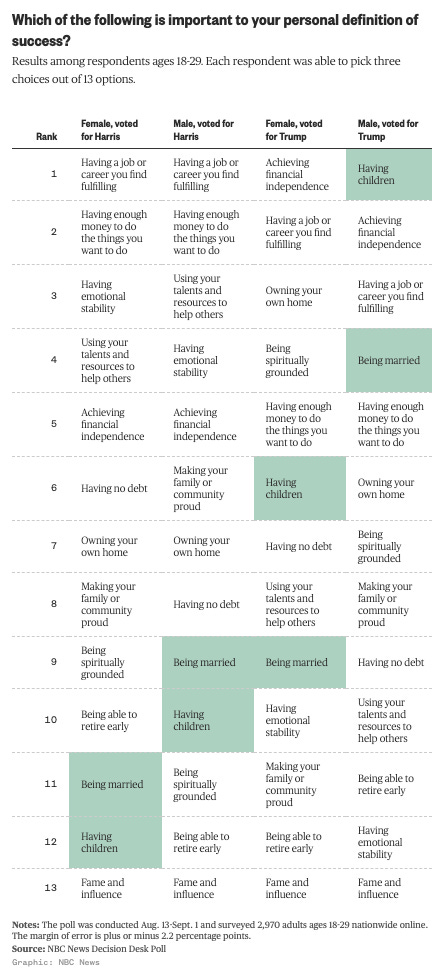The Red Bug generation
A warning from an anthropomorphized mother beetle
Before I jump into revisiting the saga of the Japanese Red Bug, one quick thing:
I botched sending out a cross-post that went up earlier this week from Naomi Darom (aka
), who interviewed me for her excellent Substack, so here it is:Something that didn’t make it in there was when I tried to draw out Naomi’s expertise (as a journalist with a PhD in the Sociology of Gender and Sexuality) to evaluate how we got into this gendered mess to begin with and why it still affects us. One of the things that Naomi pointed out that stood out for me was how, currently and historically, the stakes are set very high for mothers:
“There’s a long history of high stakes around the “good mother”. The responsibility for the well being of the family being laid onto women has been true for centuries, at least in Western society. It has also been tied to the health of the nation—the way that mothers raise our children. If they raise good soldiers and good citizens then it improves the health of the nation. Mothers were always in those positions but there was a transition of expertise to scientific expertise around the end of the 19th century. Not only were mothers seen as the ones solely responsible for the health of the family, these mothers were also given advice from different people who often portrayed themselves as moral authority. It was expected that mothers raise kids according to the latest scientific knowledge. All of that creates a really, really stressful situation.” — Naomi Darom
This note from Naomi actually relates right into the topic today – what happens when mothers are seen (and leaned upon heavily) as the ones solely responsible for the health of the family?
Why Japanese Red Bugs are on my mind (again)
Ok, I’ll get to the bugs but first let’s start with this NBC poll that came out last month.
Maybe you’ve seen it? Or read one of the think pieces that followed? I won’t get into all of it but one of the biggest takeaways (for me) came from the figure below —the clear gender (and political) divide for Gen Z on personal measures of “success”:
Here we have male Trump voters, between 18-29, ranking “having children” as their number one measure of SUCCESS.
SUCCESS.
Above financial independence. Above getting married. Way above having emotional stability.
I have no issues with men wanting children. I love when men want children and I find it wonderfully sweet when young men voice their desire to be fathers. However, I don’t think this poll results represent a desire to be a father1. I think it’s clear that these men see having children as a status symbol. And I do have issues with men basking in the glory of “having children” while expecting the women who produced those children to carry the entire parenting+caregiving load.
These men want kids… but do they want fatherhood?
And by fatherhood, I mean the invested dad version of fatherhood — the caregiving father, the pick-up-more-of-the-load father, the present-parent father, the member-of-the-PTA father, the I-play-with-my-kids-AND-wipe-their-butts father, the strive-for-equal-partnership father, the I-can’t-wait-to-get-’s-book-on-Dad Brain father. Is this what these guys mean when they rank ‘having children’ as their #1 measure of a successful life? I have my doubts.
(side note: is it weird that there is a mismatch between the ranking of “being married” and “having children”? The party that equates marriage with children swapping the order of the two? 🤔)
One of the reasons that this poll worries me is what it represents for our daughters’ generation. I have two girls and while I have no idea whether or not they will want to have children or partner and have children with men2, the mismatch seems to portend more than I care to admit about how women are perceived by a good chunk of young American male citizens. I don’t want to speak for all of these guys (maybe some are truly excited about fatherhood) but—seeing the way this group ranked everything else on that list—it seems like these men are basically saying: women are not *just* baby makers, they are *our* baby makers; in order to “succeed” by the masculine standards of Trump’s America, we need to snare ourselves a baby maker… oh, and those baby makers will also need to raise that kid “right”3. This last bit aligns well with what is happening with all the Trad Wife crap, doubling down on the image of what it means to be a “good” woman and a “good” mother”.
Ok, I don’t mean this to be a rant (as much as I love a good rant) so… what does this have to do with maternal stress?
Well, kind of everything.
Last year around exactly this time, I wrote about the potential future for women’s health should Trump win. How we should all have eyes on the health consequences when women are expected to birth and parent in a country that continues to make it more and more impossible to birth (safely) and parent (in a supported way). How the election could spell the future of the the red bug generation:
And now, you’re probably thinking, “Molly, what the hell is a red bug and why should I care?”
Let’s just start here: watch this video and let me know how you feel. Do you think that feeling would have been different two years ago?
Here is what I wrote in the good ‘ol days of October 2024:
Without additional systemic support for parents (and/or with the doubling down of the conservative view of “family”) this will inevitably rely on the sacrifice of the maternal body.
While this sacrifice may not be reflected in differences in lifespan for human women, as it does for the evolution-fated female Japanese Red Bug, I believe that it is already being reflected in women’s health span.
According to a recent McKinsey report, “women spend more of their lives in poor health and with degrees of disability [than men].” The report cites that nearly half of this gendered health burden relates to conditions that disproportionately affect women over men. These gender-skewed conditions include headache disorders, autoimmune disease, and depression. Each of those health conditions can be considered stress-related illnesses. As we know from my yelling off this Substack rooftop, and from the Surgeon General, the connections between the stress of parenting (experienced more heavily by mothers) and negative health outcomes are clear.
Women should not have to accept the inevitability of a compromised health span as a consequence of parenting.
Here we are. A year later. And a younger generation of men are declaring their intentions to overly rely on women to get their baby-daddy status symbol. Cool.
One of my biggest dreams for the Maternal Stress Project has always been to change the way we see and talk about and address stress in order to improve women’s health, at an individual level, community level, national level… hell, maybe even a global level (go big, I guess). The stressor map was intended to help assess health risk while seeing the many many many many opportunities to decrease that risk. So many opportunities.
We still have areas on this map that offer big and small opportunities for preventive health even if sweeping policy fixes and broad culture change is in a rough place right now. Narrative and language and respect and support for those in our community are the most accessible ones right now. We also have opportunities to address the stressors closer to home – mental load distribution in the home, access to time, re-evaluating sleep prioritization, re-orienting stereotypical assumptions, changing the way we buy into high pressure parenting...
On a personal level, I am starting to reevaluate how to parent my girls as they transition to women in this new reality4.
I do want to keep eyes on what we/I can control and stay (somewhat) positive. I’m really trying not to get too down about the direction of this country but they are making it so fucking hard.
Boost up a female friend today. We all need it.
One quick thing before you go — this is a beast of a project, and, while I have no plans to paywall, feeling support from readers means so much to me for the road ahead.
If you don’t already, please consider subscribing. If you do already subscribe, please consider bumping up to a paid subscription (here’s a super discount so its just $12.50 for the whole year) or sharing. Your generous support will facilitate the growth of the project… and be much appreciated!
I really wish they had a follow-up question on this. But, alas, it’s a poll. Not a research study.
My 10 year-old daughter actually said a few weeks ago: “If I have children, I’m going to need a wife.” I think she was commenting on her desire to avoid childbirth but also noted that “having kids is a lot of work.” And this is coming from a household that models a mom+dad partnership that is pretty darn close to equal!
I guess “right” could double as “right-wing” but it mostly refers to the narrow vision of a “good” child. What raised “right” could also go right back to mother blame and all the expectation around a mother’s influence on a child’s “health” and behavior. (So many quotation marks in here but, honestly, I don’t know how else to represent the bullshit of the language used in these contexts)
I really appreciate
‘s Sexism and Sensibility: Raising Empowered, Resilient Girls in the Modern World — written before Trump 2.0 but highly relevant.





Love this piece and THANKS for shouting out my book!!